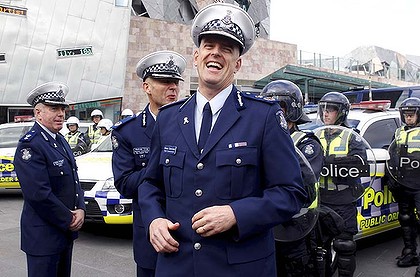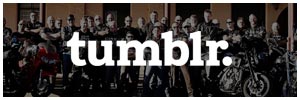YOU’RE PROBABLY A CRIMINAL IN VICTORIA NOW
The greatest protection to the innocent is that the State must prove beyond reasonable doubt in a Court of Law that the individual is guilty of an offence before they can be punished. Hence governments’ favourite catch-phrase that if you’ve done nothing wrong, you have nothing to worry about. But this basic presumption is under serious threat thanks to the latest law and order crackdown.
New laws, introduced in Victoria under the guise of ‘getting tough on bikies’ will make the threshold for declaring any group a ‘criminal organisation’ much lower.
Usually, to be punished by law, the State, via the prosecution, provides evidence of wrongdoing to the court. And not any old evidence, but evidence that actually proves the individual committed the offence – not their mates, not someone they vaguely heard of once, not a member of their family, but them, as an individual.

“I want them all with their hands up. Like this! But then shoot them anyway.”
It is fundamentally wrong for an individual to be punished, to have sanctions or control orders placed against them until it is proven, in a court of law, beyond reasonable doubt, that they have committed the offence they are accused of.
However, a new favourite of governments from all political persuasions is the concept of the ‘criminal organisation’. Rather than prove individuals have engaged in criminal activity, the governments hope to demonstrate that the organisation of which an individual is a member, is one that engages in or supports criminal activity, and as such, any member of that organisation is treated as a criminal and subject to sanctions, controls and other punishment as the government sees fit.
It does not matter if that individual has never committed a crime in their life. They are now guilty by association. And they must suffer the consequences.
Until recent times, a declaration by the Court, only provided once evidence was adduced and the State proved beyond reasonable doubt that the organisation was in fact a criminal organisation, was required before the range of sanctions came into play.
But this has changed.

“This is now the best fun ever!”
First off the rank was the Queensland Government with Attorney General Jarrod Bleijie skipping the courts altogether and simply making an executive decision that a list of 26 clubs – mainly one-percent motorcycle clubs, were criminal organisations.
No evidence was provided.
Unsurprisingly, the Queensland Government’s so-called independent overseer of the bikie crackdown, (a friend of Premier Campbell Newman, no less) retired brigadier Bill Mellor revealed that there was no empirical evidence at all to support such a claim.
And now the Victorian Government has also jumped on the bandwagon.
To its credit, and it is only a minor assurance, the declaration for either an organisation or an individual (who is or was a member of an organisation and with one other person used that organisation for criminal purposes) must be made by a court of law. But this declaration isn’t made after full and conclusive evidence is provided. There is no longer a requirement for the state to prove beyond reasonable doubt that the group or individual is actually a serious threat to public safety and order.

Murals like this have terrified the cops because they are so mural-ey.
They simply have to demonstrate that it or they probably are.
This is an incredibly low threshold. This is so low, it requires that there is a mere 51% chance the group or individual may be a threat and wham, a whole range of draconian measures come into play, including the government’s favourite of restricting items of clothing and bans on association.
There are two types of declarations – a prohibitive or restrictive declaration. A slightly different standard applies to each and the State does not have to identify which declaration it seeks from the court.
For a prohibitive declaration, the State first has to prove beyond reasonable doubt that the organisation has or is engaged in, organising, facilitating or supporting serious criminal activity, or that any two members, former members of prospective members are or have used the organisation or their relationship with that organisation for criminal purposes, or any two members or prospective members were already subject to a control order from a previous association with a declared criminal organisation.
At least for a prohibitive declaration there is some requirement for actual conclusive evidence.
This is not the case for a restrictive declaration. The above simply has to be shown on the balance of probabilities. That is, it is more likely to be so than not. A 51% chance.
The second step is for the court to decide, on those probabilities, that the organisation is one in which its activities pose a serious threat to public safety and order.
This is again a very low threshold. It does not require conclusive evidence. The standard of proof is ‘on the balance of probabilities’.
And why has the Victorian Government made these changes?
Because it has not been able to prove that any one percent motorcycle club or any other group is a criminal organisation.
Rather than reach the more legally sound conclusion that perhaps the clubs or groups are not engaging in organised criminal activities, and perhaps it is some individuals who happen to be members, former members or prospective members committing crime, it lowers the required evidence threshold to make everyone guilty by association. And not definitely guilty, but probably so.
Despite the Napthine Government assuring the opposition that the laws won’t be used on just any organisation, the police have already stated in media interviews that it’s not just bikies on their hit list. The laws can and will be used on anyone out of favour with the current regime. There is nothing stopping them attempting to declare environmental groups, unions, football clubs or even rival political groups as criminal organisations.
Given the very broad wording, and the low standard of proof required, it is quite feasible they will succeed.

“Someone’s been hiding fresh choirboys in the loft!”
There is no doubt that at least two footballers have used their relationship with a football club to lure women back to their hotels to sexually assault them. There is no doubt that religious groups, including the Catholics, Anglicans and Salvation Army have systematically supported and protected paedophiles in their midst. And there is no doubt that some political parties have at least two members who have used their organisation to commit criminal acts, and indeed the police force as well.
And once this is shown, either proven conclusively, or just shown to be probably the case, the State simply has to show that the group is probably a threat to public safety and order.
It is easy to argue that religious organisations, who have admitted to protecting and supporting paedophiles, the actions of which have destroyed the lives of thousands of innocent children, are probably a threat to public safety.
And when you’re looking at ‘probably’ rather than ‘beyond reasonable doubt’, it is easy to see how any group can be seen to be a threat. Environmental groups, particularly those that engage in political activism, will easily be shown to probably be a threat to public order, given the huge amount of police resources required whenever a protest is mooted.
Clubs, groups and individual freedom are all now at the whim of the reigning government and its ideology.
There is a very good reason, that for hundreds of years, the court has required proof of criminal activity to be shown beyond reasonable doubt. It is to protect the innocent. But Governments don’t care about the implications of watering down standards of proof. They don’t care about the possibility the laws may be abused, maybe not in their term of government, but years down the track.
They simply care about looking tough and making it easy for the police. That’s it.
There is nothing tough about punishing innocent people and nothing tough about demonising sub-cultures under the guise of protecting the public.
There is no place for ‘probably a criminal’ in Australia’s justice system. Guilt must be proven beyond a reasonable doubt.









